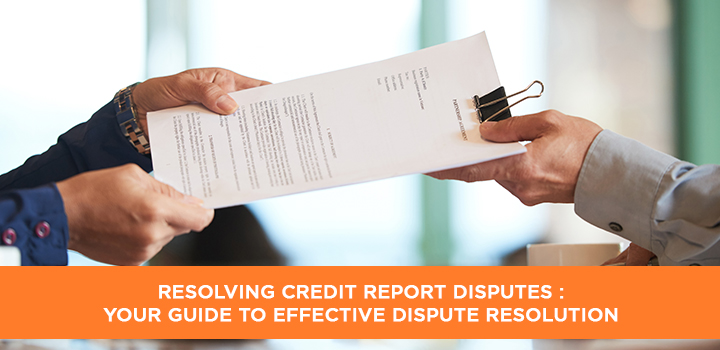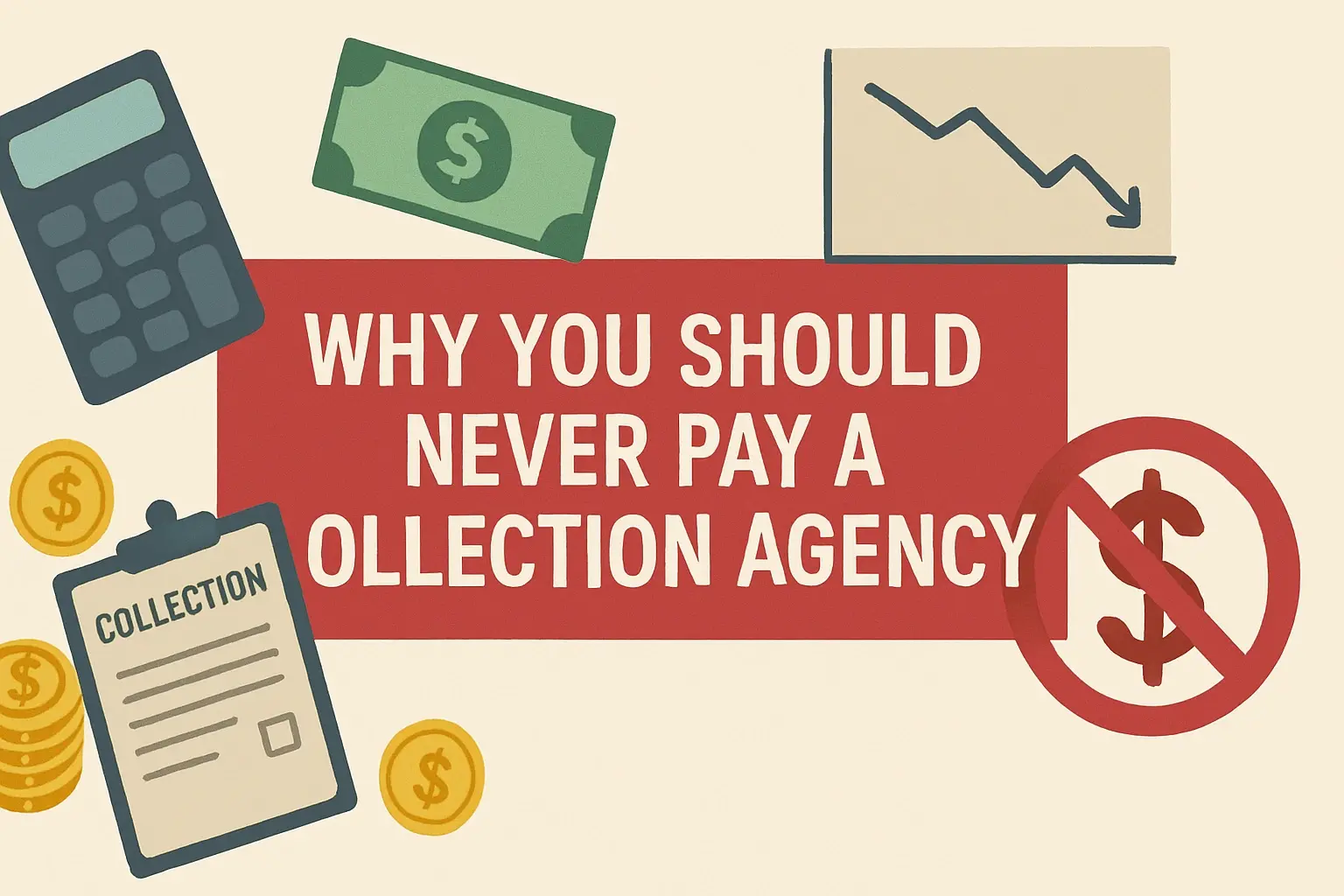-
Posted on: 29 May 2023

-
Your credit report is a crucial financial document that lenders, landlords, and even employers use to assess your creditworthiness. Inaccuracies on your credit report can negatively impact your ability to secure loans, rent an apartment, or even get a job. Fortunately, you have the right to dispute any errors you find on your credit report. This guide provides a comprehensive overview of how to effectively resolve credit report disputes and protect your credit score.
Why is Resolving Credit Report Disputes Important?
A clean and accurate credit report is essential for maintaining good financial health. Here's why resolving disputes is so important:
- Improved Credit Score: Correcting errors can significantly improve your credit score, making you eligible for better interest rates and loan terms.
- Lower Interest Rates: A higher credit score translates to lower interest rates on loans, mortgages, and credit cards, saving you money in the long run.
- Access to Credit: Accurate credit reports ensure you have access to the credit you need when you need it.
- Avoid Identity Theft: Monitoring your credit report and resolving disputes can help you detect and address potential identity theft.
- Fair and Accurate Representation: Ensuring your credit report is accurate guarantees that lenders are making decisions based on true information about your credit history.
Step-by-Step Guide to Resolving Credit Report Disputes
Step 1: Obtain Your Credit Reports
The first step in resolving credit report disputes is to obtain your credit reports from the three major credit bureaus: Experian, Equifax, and TransUnion. You are entitled to a free credit report from each bureau annually through AnnualCreditReport.com.
It's crucial to review reports from all three bureaus because information can vary between them. Some lenders may only report to one or two bureaus, so inaccuracies might exist on only one or two reports.
Step 2: Identify Inaccurate Information
Carefully review each credit report line by line, looking for any errors, inconsistencies, or inaccuracies. Here are some common types of errors to watch out for:
- Incorrect Personal Information: Misspelled names, incorrect addresses, or inaccurate Social Security numbers.
- Duplicate Accounts: Multiple listings of the same account.
- Closed Accounts Reported as Open: Accounts that you have closed but are still listed as open on your report.
- Incorrect Account Balances: Inaccurate outstanding balances on credit cards or loans.
- Late Payments Reported in Error: Payments that you made on time but are incorrectly reported as late.
- Accounts Not Belonging to You: Accounts that you don't recognize and that may be a result of identity theft.
- Incorrect Credit Limits: Credit limits that are different from what you agreed upon.
- Data Furnishers Reporting Incorrectly: Creditors or lenders reporting inaccurate information.
Step 3: Gather Supporting Documentation
Before you file a dispute, gather any supporting documentation that can help prove the inaccuracy of the information. This might include:
- Account Statements: Credit card or loan statements showing correct balances and payment history.
- Payment Confirmations: Proof of payments made on time.
- Correspondence with Creditors: Letters or emails exchanged with creditors regarding the account.
- Identity Theft Reports: If the error is related to identity theft, include a copy of the police report.
- Court Documents: Documents showing discharged debts in bankruptcy, divorce decrees affecting accounts, or any judgments.
Step 4: File a Dispute with Each Credit Bureau
You must file a separate dispute with each credit bureau that contains the inaccurate information. You can file a dispute online, by mail, or by phone. However, filing online or by mail is generally recommended as it provides a written record of your dispute. Here’s how to file a dispute with each bureau:
Experian
- Online: Through Experian's online dispute center on their website.
- By Mail: Experian, P.O. Box 4500, Allen, TX 75013
Equifax
- Online: Through Equifax's online dispute center on their website.
- By Mail: Equifax Information Services LLC, P.O. Box 740256, Atlanta, GA 30374
TransUnion
- Online: Through TransUnion's online dispute center on their website.
- By Mail: TransUnion LLC, Consumer Dispute Center, P.O. Box 2000, Chester, PA 19016
Step 5: Writing a Credit Dispute Letter
While online disputes are convenient, a written dispute letter is often more effective because it allows you to provide detailed explanations and attach supporting documentation. Here's what to include in your dispute letter:
- Your Full Name and Address: Include your current address and any previous addresses where you may have lived.
- Social Security Number: For verification purposes.
- Date of Birth: Also for verification.
- Account Number: The account number of the item you are disputing.
- Specific Details of the Error: Clearly explain what information is inaccurate and why. Be specific and avoid vague language.
- Explanation of Why It’s Incorrect: Clearly explain why the listed information is wrong and what the correct information should be.
- Supporting Documentation: Attach copies of any documents that support your claim. Do NOT send original documents.
- Request for Investigation: Specifically request that the credit bureau investigate the disputed item and correct or delete it.
- Your Signature: Sign and date the letter.
Sample Credit Dispute Letter:
[Your Name] [Your Address] [Your City, State, Zip Code] [Your Phone Number] [Your Email Address] [Date] [Credit Bureau Name] [Credit Bureau Address] [Credit Bureau City, State, Zip Code] Subject: Credit Report Dispute Dear [Credit Bureau Name], I am writing to dispute inaccurate information on my credit report. I am submitting this dispute in accordance with the Fair Credit Reporting Act (FCRA). The following information is inaccurate: * **Account:** [Account Number] * **Item Being Disputed:** [Specifically describe the inaccurate information, e.g., "Late payment reported for July 2023."] * **Reason for Dispute:** [Explain why the information is inaccurate, e.g., "I made the payment on time, and I have attached a copy of my bank statement as proof."] I request that you investigate this matter and remove or correct the inaccurate information as soon as possible. I have enclosed copies of supporting documents to help substantiate my claim. Thank you for your prompt attention to this matter. Sincerely, [Your Signature] [Your Typed Name]
Step 6: Follow Up and Monitor Your Credit Reports
The credit bureaus have 30 days to investigate your dispute after receiving it. They may request additional information from you during this time. After the investigation, they will notify you of the results. Be sure to keep copies of all correspondence and documents related to your dispute.
If the credit bureau finds that the information is inaccurate, they will correct or delete it from your credit report. They are also required to notify you and any other credit bureaus that may have the same inaccurate information. However, it is wise to check again with all three bureaus to ensure the correction has been made across the board.
If the credit bureau finds that the information is accurate, you have the right to add a statement to your credit report explaining your side of the story. This statement will be included whenever your credit report is accessed by lenders or other parties.
Step 7: Escalate the Dispute (If Necessary)
If the credit bureau's investigation does not resolve the issue to your satisfaction, you have the right to escalate the dispute. This may involve:
- Filing a Complaint with the Consumer Financial Protection Bureau (CFPB): The CFPB is a federal agency that oversees consumer financial protection laws. You can file a complaint with the CFPB online or by mail.
- Contacting the Creditor Directly: Contact the creditor who reported the inaccurate information and ask them to correct it.
- Consider Legal Action: If all other avenues have been exhausted, you may consider consulting with an attorney about taking legal action against the credit bureau or creditor.
Common Mistakes to Avoid When Resolving Credit Report Disputes
- Failing to Check All Three Credit Reports: Ensure you obtain and review reports from Experian, Equifax, and TransUnion.
- Submitting Vague Disputes: Be specific and provide detailed explanations of the inaccuracies.
- Sending Original Documents: Always send copies of supporting documents, not originals.
- Giving Up Too Easily: Be persistent and follow up if your dispute is not resolved to your satisfaction.
- Not Keeping Records: Keep copies of all correspondence and documents related to your dispute.
- Failing to Monitor Your Credit Reports After Resolution: Regularly monitor your credit reports to ensure accuracy and detect any new errors.
The Fair Credit Reporting Act (FCRA)
The Fair Credit Reporting Act (FCRA) is a federal law that protects consumers' rights related to credit reporting. The FCRA gives you the right to:
- Access Your Credit Report: You have the right to request a free copy of your credit report from each of the three major credit bureaus annually.
- Dispute Inaccurate Information: You have the right to dispute any inaccurate information on your credit report.
- Have Errors Corrected or Deleted: If the credit bureau finds that the information is inaccurate, they must correct or delete it.
- Add a Statement to Your Credit Report: If the credit bureau finds that the information is accurate but you disagree, you have the right to add a statement to your credit report explaining your side of the story.
- Sue for Damages: If the credit bureau or creditor violates the FCRA, you may be able to sue for damages.











